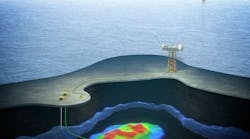While security remains a serious challenge, Iraq is making progress in restoring production and export of crude oil and petroleum products, current and former officials of the Iraqi Oil Ministry said Sept. 9 in Dubai. Speaking at the Middle East Petroleum and Gas Conference, the Iraqis offered a rough timetable for increases in oil production and exports and projected needs of the Iraqi refining and gas processing industries.
Thamir A. Al-Ghadhban, CEO of the Oil Ministry, estimated current oil production capacity at 2 million b/d but said output is limited by export capacity of no more than 1 million b/d.
Al-Ghadhban said production capacity might reach 3 million b/d of oil by the end of next year's third quarter, an increase that Iraq can fund alone. With minor financial assistance from abroad, the Iraqi industry can further raise capacity to 3.5 million b/d of oil.
The ministry maintains a longstanding, longer-term goal of raising production capacity to 6 million b/d of oil, which would require external financing. Al-Ghadhban said the increment at 4.5-6 million b/d of oil would involve international oil companies.
Along with raising oil production, the ministry wants to advance war-stalled plans to develop nonassociated natural gas fields. Those plans include development of five fields to support gas exports to Turkey and Syria.
Before the Iraqi invasion of Kuwait in 1990, Iraq exported 200 MMcfd of gas to Kuwait through a pipeline with twice that much capacity.
"That option is there," Al-Ghadhban said. "I can't say when." He stressed that work depends on improvement to security and working conditions of ministry staff and oil field workers.
Privatization obstacles
Al-Ghadhban also said privatization of Iraqi oil and gas resources wouldn't occur anytime soon. Privatization is more likely in transportation and, in the more distant future, new refineries in joint venture projects involving the government.
Any privatization would have to occur "in parallel with development of the national economy" and would require "approval of an elected parliament."
The oil ministry will pursue cooperation in some form with international oil companies without offering ownership of resources.
"The major obstacles have been largely overcome," Al-Ghadhban said. Participation terms remain a question and might range in structure from modified buy-back to production-sharing contracts.
"We have the reserves," he said. "We need to expand. We know the international companies need to develop reserves and make money."
But he added: "There are a lot of political issues connected with oil in Iraq. We have to be careful."
Oil industry 'far from being satisfactory'
Muhammad M.S. Al-Jibori, director general of State Oil Marketing (SOMO), called the frequently sabotaged Iraqi oil industry "far from being satisfactory" but said, "There is hope, and there is eagerness and devotion among all of us to rebuild the country's energy sector and to give Iraq what it deserves as a major producer and exporter of oil."
He forecast Iraqi crude oil exports at 1 million b/d in September and October, 1.1 million b/d in November, and 1.2 million b/d in December. The gradual increase, he said, "may continue in 2004."
Iraq oil exports reached 2.2 million b/d in February before falling to 1.4 million in March, when the invasion to depose President Saddam Hussein began. Exports restarted in June at 300,000 b/d and rose to 400,000 b/d in July and 700,000 b/d in August, Al-Jibori said.
Saadalla Al-Fathi, a former Oil Ministry official now working as a consultant in Dubai, said security problems persist at the three major Iraqi oil refineries, which are operating at 50-60% of capacity.
Normal total product output of the unsophisticated refineries at Daura, Basra, and Baiji is 560,000 b/d, the product split depending on operation of the only hydrocracker, at Baiji.
In 2002, Iraq exported liquid petroleum gas, diesel, fuel oil, and small amounts of other products. Now it must import supplemental supplies of all products except fuel oil.
With demand for light products growing, Al-Fathi said, Iraq's refining industry must add both crude and conversion capacities.
A plan developed during the period of United Nations sanctions called for 150,000 b/d of crude capacity at new refineries in the central region of the country. It also called for installation of isomerization units with capacities of 20,000 b/d at Baiji and 10,000 b/d each at Basra and Daura. The plan further envisioned 40,000 b/d of fluid catalytic cracking capacity at Baiji and 30,000 b/d of hydrocracking capacity at Basra.
Al-Fathi said Iraq's four main gas processing plants have inlet capacities totaling 2.081 bscfd of gas and product capacities totaling 1.55 bscfd of dry gas, 5.5 million tonnes/year of LPG, and 1.87 million tonnes/year of natural gasoline.
Iraq's natural gas plan includes one or two new plants in the southern producing area and a third train at the 536 MMscfd North Gas plant.
According to the plan, production of LPG from existing plants would rise from 3 million tonnes/year in 2004 to 4 million tonnes/year in 2008 and remain there through 2013. New installations in the north would add 300,000 tonnes/year in 2008, rising to 500,000 tonnes/year in 2013. New plants in the south would have capacities of 1.8 million tonnes/year in 2008, rising to 2 million tonnes/year in 2013.
Al-Fathi cited an estimate of the investment requirements of all the Iraqi energy industry, including rehabilitation and expansion of oil production capacity, through 2010 of $39.85 billion.

